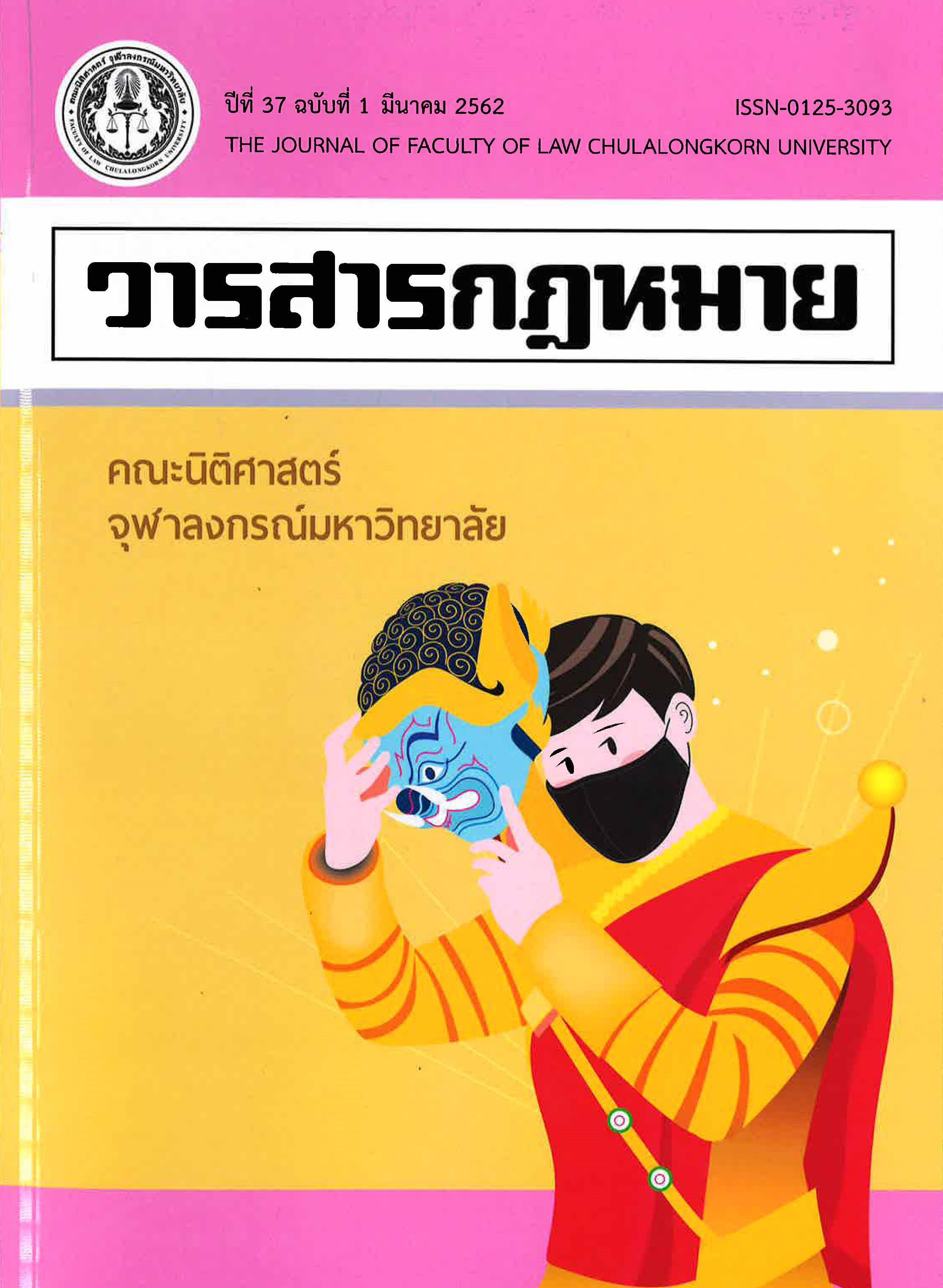การตกลงร่วมกันภายใต้พระราชบัญญัติการแข่งขันทางการค้า พ.ศ.๒๕๖๐ : มุมมองทางเศรษฐศาสตร์ เจตนารมณ์ และประเด็นความท้าทาย
Main Article Content
บทคัดย่อ
บทความดังกล่าวมุ่งเน้นที่จะพิจารณาใน ๓ ประเด็นเป็นสำคัญ กล่าวคือ การวิเคราะห์ผลร้ายทางเศรษฐศาสตร์อันเกิดจากการตกลงร่วมกัน บทบัญญัติการตกลงร่วมกันของไทยภายหลังที่มีการปรับแก้กฎหมายรวมถึงเจตนารมณ์เบื้องหลังการปรับแก้ภายใต้พระราชบัญญัติการแข่งขันทางการค้า พ.ศ.๒๕๖๐ รวมถึงประเด็นความท้าทายอันเกิดจากการพัฒนาทางเทคโนโลยีอย่างรุดหน้า ซึ่งทำให้เกิดช่องว่างในการประใช้กฎหมายแข่งขันทางการค้าต่อพฤติกรรมการต่อต้านการแข่งขันทางก้ารค้ารูปแบบใหม่ๆ โดยบทความดังกล่าวมุ่งเน้นกรณีศึกษาประเด็นการตกลงร่วมกันอันเกิดจากอัลกอริทึม
ในเบื้องต้นผู้เขียนประสงค์ที่จะตอบคำถามที่ว่า การตกลงร่วมกันก่อให้เกิดผลเสียทางเศรษฐศาสตร์อย่างไร โดยจะวิเคราะห์เปรียบเทียบกับตลาดในสภาวะปกติที่มีการแข่งขันแบบสมบูรณ์เพื่อดูถึงผลกระทบของการตกลงร่วมกันต่อผู้บริโภคและระบบเศรษฐกิจแบบองค์รวม และจะวิเคราะห์การปรับใช้หลักความผิดในตัวเอง (Per se illegality) และหลักเหตุผล (Rule of Reason) ต่อพฤติกรรมการตกลงร่วมกันต่างประเภทกัน
บทความฉบับนี้ยังมุ่งเน้นที่จะพิจารณาถึงเจตนารมณ์ของการปรับแก้พระราชบัญญัติการแข่งขันทางการค้าของไทยฉบับใหม่ โดยพิจารณาเฉพาะบทบัญญัติซึ่งเกี่ยวข้องกับการตกลงร่วมกัน ทั้งในส่วนการพิจารณาการกระทำความผิดและบทลงโทษ อีกทั้งผู้เขียนประสงค์ที่จะหยิบยกประเด็นที่เกี่ยวกับความท้าทายอันเกิดจากการพัฒนาทางเทคโนโลยีใหม่ๆ โดยเฉพาะในแง่มุมการตกลงร่วมกันในมุมมองของกฎหมายแข่งขันทางการค้า และพยายามเสนอแนะแนวทางแก้ปัญหาเพื่ออุดช่องว่างทางกฎหมายโดยอาศัยบทบัญญัติกฎหมายใกล้เคียงอย่างยิ่งที่มีอยู่ในปัจจุบัน
คำสำคัญ : บทบัญญัติการตกลงร่วมกัน, กฎหมายการแข่งขัทางการค้า, พระราชบัญญัติการแข่งขันทางการค้า พ.ศ.๒๕๖๐, การตกลงร่วมกันซึ่งเกิดจากอัลกอริทึม, ผลร้ายในแง่มุมทางเศรษฐศาสตร์
Article Details
ลิขสิทธิ์และเนื้อหาในเว็บไซต์ของวารสารกฎหมาย (รวมถึง โดยไม่จำกัดเฉพาะ เนื้อหา รหัสคอมพิวเตอร์ งานศิลป์ ภาพถ่าย รูปภาพ ดนตรีกรรม โสตทัศนวัสดุ) เป็นกรรมสิทธิ์ของวารสารกฎหมาย และผู้ได้รับการโอนสิทธิทุกราย
1. วารสารกฎหมาย ให้อนุญาตให้คุณใช้สิทธิอันไม่เฉพาะเจาะจงที่สามารถถูกถอนเมื่อใดก็ได้ โดยไม่มีค่าใช้จ่าย ในการ
- เยี่ยมชมเว็บไซต์และเอกสารในเว็บไซต์นี้ จากคอมพิวเตอร์หรือเครื่องมือสื่อสารผ่านเว็บบราวเซอร์
- คัดลอกและจัดเก็บเว็บไซต์และเอกสารในเว็บไซต์นี้บนลงคอมพิวเตอร์ของคุณผ่านระบบความจำ cache
- สั่งพิมพ์เอกสารจากเว็บไซต์นี้สำหรับการใช้ส่วนตัวของคุณ
- ผลงานที่ได้รับการตีพิมพ์โดยวารสารกฎหมาย จุฬาลงกรณ์มหาวิทยาลัย ถูกคุ้มครองภายใต้ Creative Commons Attribution 4.0 International License ซึ่งอนุญาตให้ทุกคนสามารถคัดลอก แจกจ่าย ดัดแปลง ส่งต่อ ผลงานได้ ก็ต่อเมื่อผลงานและแหล่งข้อมูลได้รับการอ้างอิงอย่างเหมาะสม
2. วารสารกฎหมาย จุฬาลงกรณ์มหาวิทยาลัย สงวนสิทธิ์ไม่อนุญาตให้คุณใช้สิทธิอื่นใดที่เกี่ยวข้องกับเว็บไซต์และเอกสารบนเว็บไซต์นี้ เช่น การคัดลอก ดัดแปลง เปลี่ยนแปลง ส่งต่อ ตีพิมพ์ แจกจ่าย เผยแพร่ จัดแสดงในที่สาธารณะ ไม่ว่าจะในรูปแบบใดก็ตาม ซึ่งเว็บไซต์หรือเอกสารบนเว็บไซต์ โดยไม่อ้างอิงถึงแหล่งข้อมูลหรือโดยไม่ได้รับอนุญาตเป็นลายลักษณ์อักษรจากวารสารกฎหมาย จุฬาลงกรณ์มหาวิทยาลัย
3. คุณอาจขออนุญาตที่จะใช้เอกสารอันมีลิขสิทธิ์บนเว็บไซต์นี้โดยการเขียนอีเมลล์มายัง journal@law.chula.ac.th
4. วารสารกฎหมาย จุฬาลงกรณ์มหาวิทยาลัย เข้มงวดกับการคุ้มครองลิขสิทธิ์อย่างมาก หากวารสารกฎหมาย จุฬาลงกรณ์มหาวิทยาลัยพบว่าคุณได้ใช้เอกสารอันมีลิขสิทธิ์บนเว็บไซต์นี้โดยไม่ถูกต้องตามการอนุญาตให้ใช้สิทธิ ดังที่กล่าวไปข้างต้น วารสารกฎหมาย จุฬาลงกรณ์มหาวิทยาลัยอาจดำเนินคดีตามกฎหมายต่อคุณได้ เพื่อเรียกร้องค่าเสียหายที่เป็นตัวเงินและคำขอชั่วคราวให้คุณหยุดการใช้เอกสารดังกล่าว ทั้งนี้ คุณอาจถูกสั่งให้ชดใช้ค่าใช้จ่ายใดๆ ที่เกี่ยวข้องกับการดำเนินการตามกฎหมายนี้
หากคุณพบเห็นการใช้เอกสารอันมีลิขสิทธิ์ของวารสารกฎหมาย จุฬาลงกรณ์มหาวิทยาลัย ที่ขัดหรืออาจขัดต่อการอนุญาตให้ใช้สิทธิดังที่ได้กล่าวไปข้างต้น โดยเชื่อว่าได้ละเมิดลิขสิทธิ์ของคุณหรือของผู้อื่น สามารถร้องเรียนมาได้ที่ journal@law.chula.ac.th


